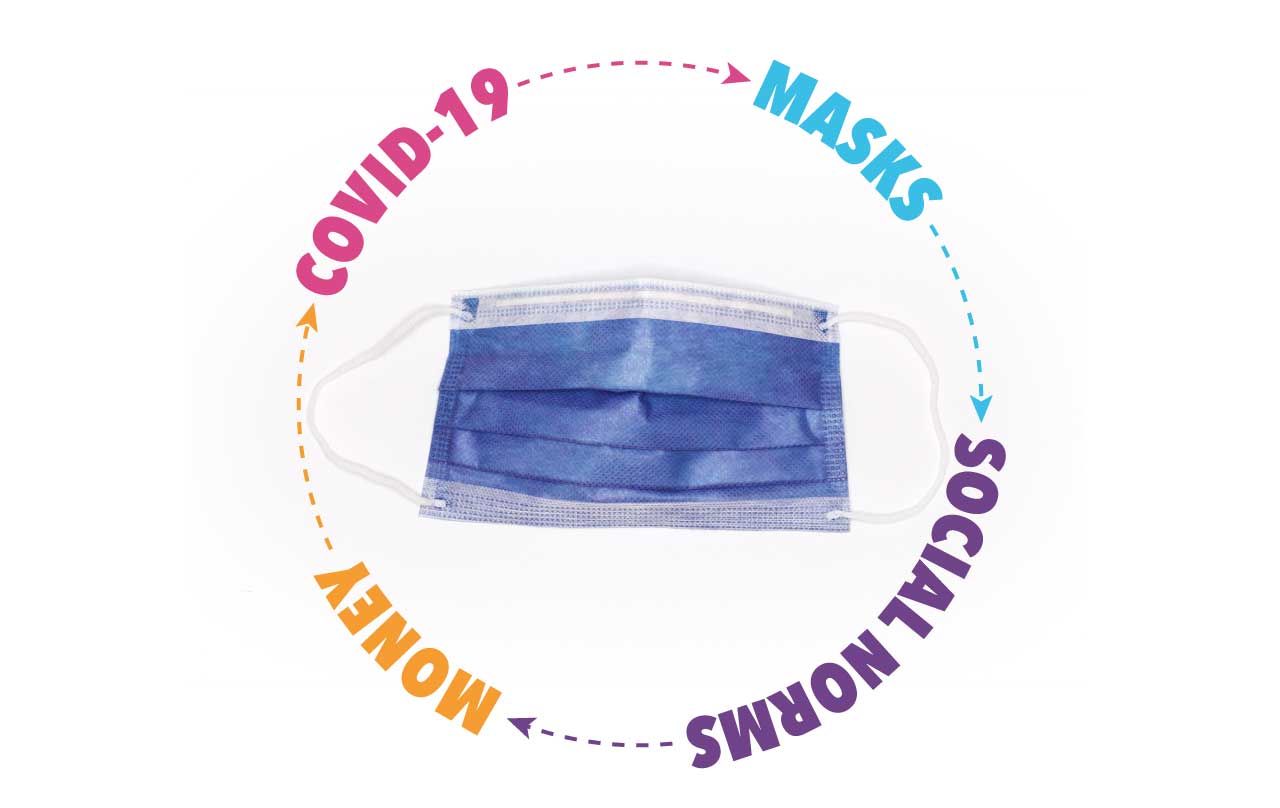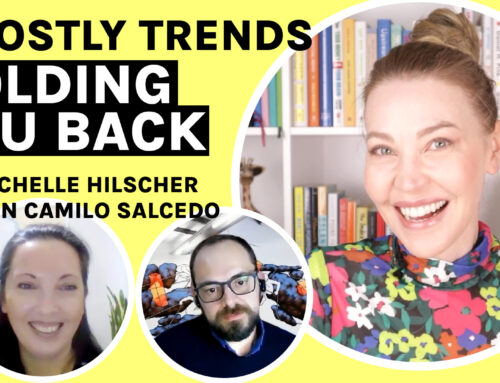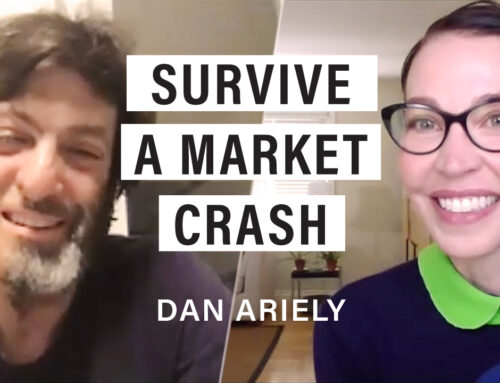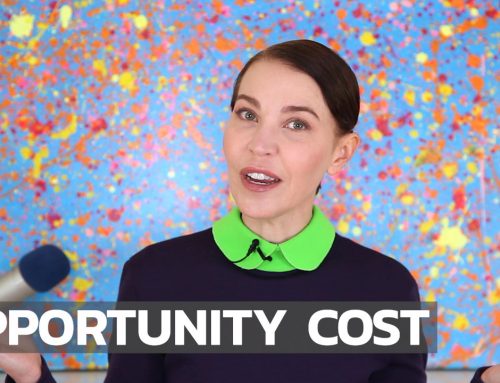At first people looked away when I wore a mask. Then they hugged me. Then they berated me. Now masks are en vogue and in Vogue. Whaaat happened?
Social norms are changing quickly thanks to COVID-19.

Let’s start with mask-wearing. Then I’ll Squawk about your money.
I started wearing a face mask in public when my immune system crashed during chemotherapy last summer – seven months before the COVID-19 pandemic hit Canada. Wearing a medical mask in public was odd and isolating; it signaled I wasn’t well. People looked away out of discomfort and I stuck out in public because masks did not fit in. I didn’t look ‘normal’.
Drawing a pink ribbon on my mask helped a lot. Adding the well-recognized breast cancer symbol to my masked face communicated WHY I was shielded. People now waved, smiled, and even approached me to share stories about their own cancer experiences. I even got a few virtual hugs at the grocery store.
Then COVID-19 happened.
Suddenly, personal protective equipment (PPE) was in short supply and anyone wearing a medical mask in public was called out for it. Whaaat? How did my mask use become so reviled?
Because I’m immune compromised after cancer chemo. Because I still need to eat.
Because a chemo nurse gave me the mask.
Chill, Jennifer. https://t.co/igSA2GFGdx— Kerry K. Taylor (@squawkfox) March 28, 2020
I went from being shunned in public, to being approachable, to being despised – all in a hot minute.
Awesome.
Actually, not awesome, but totally horrible. Then something happened. Again.
Fashion houses started creating designer masks, entrepreneurs on Etsy started selling unique face covers, and social influencers donned fashion masks in public places to support a unified front against the spread of COVID-19.
Trudeau says he intends to wear mask on Parliament Hill https://t.co/3ZfhSAlEM3 @GlobePolitics pic.twitter.com/cX1pvd86ra
— The Globe and Mail (@globeandmail) May 20, 2020
Prime Minister Justin Trudeau said he would wear a mask on Parliament Hill to prevent the dreaded “speaking moistly”, and Canada’s Chief Public Health Officer – Dr. Theresa Tam – now recommends wearing a mask in public.
Retailers like Costco have a new mask policy.
“Any business has the right to refuse anyone,” says Premier Doug Ford on the use of masks when shopping.#onpoli #COVID19
— Robert Benzie (@robertbenzie) May 22, 2020
Wearing a mask suddenly became acceptable, required, and very fashionable. Vogue announced that masks are the breakout trend of summer.
My immune system doesn’t care much about Vogue, but people do. We are social animals and we respond strongly to social approval.
To create this level of change, a new behaviour must reach a higher level and hit the status of a social norm. Social norms shift when two things change: our perception of how people should behave (does this look and feel right?), and the notion of fitting in (does this behaviour conform to or violate the norm).
A social norm gets real when we collectively believe we’re doing something others expect us to do. The expectation of wearing masks already existed in the cancer community, but it became a community-backed social norm to help prevent the spread of COVID-19. “We’re all in this together” is the collective thinking that turned mask wearing into a social norm so quickly.
But what about money? If COVID-19 has the power to change face wear, what about our spending, saving, and cash-using habits?
Social Norms, COVID-19, Your Money
When was the last time you’ve used cash during the pandemic? Since lockdown, I’ve noticed retailers moving towards cashless payment systems. The Bank of Canada has asked retailers to keep accepting cash despite COVID-19 concerns because many people depend on cash and have limited payment options.
The administration at my local farmers’ market asked vendors to provide cashless payment as a precautionary measure against COVID-19.
Can you get COVID-19 from physical money? Fair question. Recent science regarding the risk of infection from contaminated surfaces says: “It is possible to be infected with SARS-CoV-2 through indirect transmission, but it appears to be exceedingly rare.”
Science is one thing. Public perception is another. If the public collectively believes passing cash around increases personal risk, then guess what? Mobile payment systems and touchless payment processes increasingly become the social norm and human contact with physical currency becomes less socially acceptable.
So what’s the big deal? As a money expert I’ve been a long time fan of physical dollars and cents because paying with cash increases loss aversion – it feels more painful to pay in cash than it does to tap a credit card – and this pain decreases spending.
Going mobile and cashless is proven to increase spending – check out Behavioral Science: 3 Tricks to Help You Pay Off Debt Faster for the details. My bottom line is I’m a fan of spending less and saving more, so I’m concerned by a further decline of cash.
So what’s the future of cash? It’s unlikely cash will completely disappear, but we may be moving to a “cash-lite” system where contactless payment processing is favoured. As we’ve seen with mask wearing and use, social norms can change quickly in the face of this pandemic.
Social Norms! So where am I going with this?
Social norms and consumption habits are notoriously hard to change. The pandemic has forced us to change shopping patterns too.
Ask yourself this:
What changed your spending habits?
- A budget
- Hiding your credit cards
- COVID-19
Staying at home cuts commuting costs, transit, and fuel. Eating at home cuts restaurant, takeout, and bar tabs. Cosmetic and clothing sales are down. We all need a haircut. Travel and tourism are of course waaaaay down.
In a few short weeks the pandemic has accomplished more change to consumption patterns than any budget spreadsheet I could offer.
As we slowly move out of quarantine, go ahead and reflect on what mattered most in isolation. What was worth the spend? What is worth ditching? You may be surprised how some new habits are worth keeping. Personally, I hated grocery shopping online. Ugh. Awful.
Stay safe, you are loved.
Love love love,
Kerry





I’ve been thinking about this the last week and realized that Covid19 has made me more aware at all the *other* things we have been unconsciously doing/sharing forever. I’m betting that there have been a lot fewer colds or people with the flu in the last couple of months. A lot fewer people with bacterial “grunge” because they’re not touching the money that the guy who didn’t wash his hands in the bathroom handed them.
I’ve been using credit cards to pay as much as possible the last 20-30 years. In the last 5-10 I’ve only used cash a double handful of times per year. It literally takes me 6 months to go through my typical $300 withdrawal from the ATM. In the last couple of years I’ve not even had to pull out a credit card – I just hover my phone over the payment device and touch the fingerprint sensor. This has worked for me all over the USA (where I live) as well as Canada (where I’m from) and all of Scandinavia last year and Croatia the year before.
I have seen lots of “no cash” signs since Covid19 began. I think soon enough paying with cash will be extremely difficult and/or looked down upon. “Oh – you must be poor or homeless if you can’t pay with card or phone”.
Amazing. I’d never seen a picture of you before… and first one I see is the that big one near the top of the page. Wow! Then further down I see another picture of you. Both wearing a mask. 2nd pic of course was a link to Instagram… not something I tend to visit. Even more pics. And the one thing that stood out for me was the masks make your amazing eyes stand out even more. What can I say but Wow, Wow, Wow.
So how about that question? About using cash… I can honestly say in the last 20 years I’ve probably used cash no more than 50 times. Seriously… its all been credit card or EFT POS.
But then New Zealand’s been much like that for a long, long time. Currently as consumers we are NOT charged a fee for using EFT POS cards or credit cards.
One major bank no longer issues cheques for individuals and if one is presented as a deposit, not to exchange for cash mind you, then there is a quite hefty surcharge. They will not pay out cash over the counter. And in the last week or so another 2 banks have signalled that they will no longer be issuing cheques, partly because of the cost, and partly to eliminate that vector for fraud. I believe that there are some large businesses who are holding out from going totally electronic and away from cheques. Guess why? Because it gives them breathing time to ensure that the money is in their accounts. And that’s because they won’t get serious about their customers (usually other businesses) making timely payments.
Paul: You’re probably confusing me with Cindy Crawford. Happens all the time. 🤣 On money, I generally use cashless payments too.
Rob: I’m seeing a lot of “no cash” signs too. Guess cash isn’t king?
@paul My last trip to NZ (and 10 months later to Australia) I never even saw cash. Paid for everything with card or phone. Of course, merchants there are sneaky and always want to charge in US$ when the know you’re a tourist. I always have to make them charge in local currency so I don’t get taken on the exchange rate. Banks here in the USA are in the stone ages and checks are still a thing. Even stores were taking checks before Covid – no idea now. There’s nothing more annoying than being stuck behind the little old lady paying for her groceries with a check! I last bought a book of checks in 2003 and still have half of them left. Haven’t used one in 5 years at least.
@kerry cash isn’t king any more. I do get the whole “keeping track of your money” problem, but I do so independently of how I pay. The banking/credit card app on my phone, or the bank/credit card website have you transactions amazingly quickly!
I just checked and if one doesn’t want to use a credit card, a bank card that withdraws directly from your bank works with apple pay, too. And probably in the payment machines at vendors as well. But credit cards are safer, and apple pay with a credit card even safer!
Also, for person-to-person payments down here in Trumpistan I use a service called “Zelle” that many banks have subscribed to. Instant funds transfer. Up on the other side of the border I’ve used “Interac” to do the same thing.
Soon enough cash will be a memory!
I mostly pay for things with my rewards CCs, but we have always paid our bill in full every month.
Every so often, hubby gets paid in cash for a job, rather than cheque or Interac, so I do have cash to spend. I haven’t taken money out of the ATM in years. Mainly I use cash for small stuff, like Blizzards at DQ (who currently only take cards), lottery tickets, or at the self-checkout at the SAVE-On at Polson Mall – they still take cash.
During COVID, I’ve used cash at the Polson Lottery kiosk (you’ll know where that is). I wiped it down with sanitizer the first time I went there and the lady said ‘don’t worry, we handle cash all day long and it just goes in with the unsanitized stuff’.
I work from home, so my spending hasn’t changed much, although we obviously haven’t been going out to eat.
I don’t care much for online grocery shopping. I did it after surgery a few years back, and it was great, but right now, when often stores don’t have what you want in stock, I would rather go get my own and choose from what IS there.
Good luck with your scan results!
Brenda
I really understood your comments about wearing a mask before everyone else did. I am 66 and a physician assistant in a gastroenterology office in Upstate Nee York. In early March I began wearing a surgical mask to go into exam rooms with my patients, as I was very concerned about exposure and the news in New York was scarier day by day. Patients were scared of ME thinking I was sick! Now for the past month we are all in masks and the only patient visits for now are by video or phone. What a strange world. As for cash, even the little summer ice cream stand takes cards only here!
I detest the move to card payments all over the place.
First reason is that I like to take money out of the bank and stop spending when my wallet is empty. Budget control without effort.
Second reason is I don’t want my bank to know every single thing I buy. Or whoever hacks the next system. None of your business if I buy timbits too often, or pizza, or magazines, or pay too many overdue fines at the library, or buy a pair of earrings I don’t need at the farmers market, etc.
I do use cards for larger purchases, to double warranty, and for online shopping.
Final reason I will never let go of cash – I live where there are hurricanes and nor’easters and random things that knock out power for days. Then cash is king again!
When searching around, I happened to find back this post, which is excellent! Thank you Keery for it. It perfectly summarizes the evolution of social norms concerning the use of masks. I would like to add to it that wearing a mask also has a cultural aspect. I now live in Germany, but before the pandemic, I lived for several years in Singapore, which is a very multi-cultural country. So, when it comes to wearing masks, before COVID-19, one could observe different social norms in place. For the people from a rather Chinese-like culture, even with a little cold, wearing a mask was a must as they had this strong feeling of community and did not want to contaminate people around them. On the other hand, the expatriates more from a western-like culture would observe this behaviour baffled or even amused. Nowadays, like in Canada, everyone, independently from his/her culture, is wearing a mask, and nobody is wondering about it. Quite amazing!
Concerning the question of cash, let me share the point of view of somebody living in Germany where cash is still partially king! I think, here again, it is a very cultural question. Singapore and China were already cash-light before Corona, so I believe that they are now almost cash-free. (In China even beggers in the street sometimes have QR codes that people can scan to send them money online! I am still amazed about it). In the case of Germany, before Corona, it was not unusual to pay several hundred in cash! After the pick of Corona, cash payments have decreased, but they are still very present. Many shops, especially smaller ones (but also bigger ones and restaurants), still do not accept card payments. Thus, I think that cash is not going to disappear anytime soon in Germany, even with new waves of COVID-19. Therefore, although COVID-19 may have changed some habits and social norms in a quite extreme way, some (like cash payment in Germany) are still there because of cultural reasons.